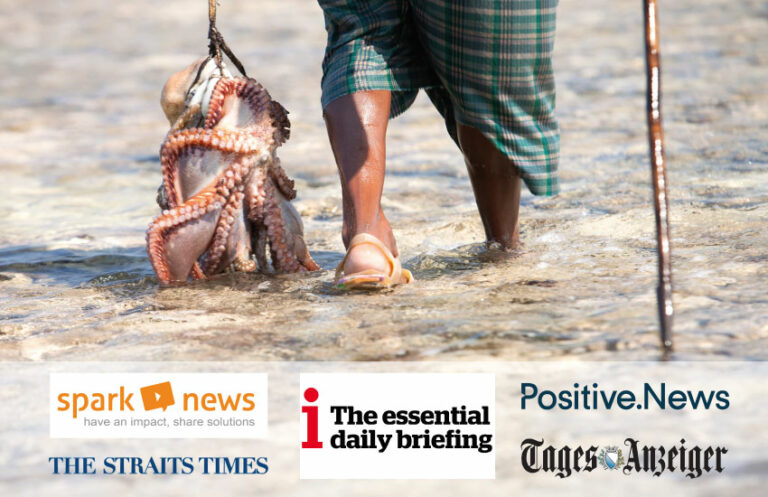June 24th 2017 was #ImpactJournalism Day, and Blue Ventures received coverage from several international news sources including i News in the UK, Straits Times in Singapore and Tages Anzeiger in Switzerland.
Impact Journalism Day is an international editorial operation that partners with the world’s most important daily newspapers to publish, on the same day in print and digital formats, supplements that feature over 60 inspiring and feasible solutions to concrete problems.
Blue Ventures’ coverage primarily focussed on an interview given by Blue Ventures founder Alasdair Harris about the effectiveness of temporary octopus fishery closures at catalysing community conservation efforts.
“The decline of fish stocks worldwide is a critical problem for livelihoods and food security,” says Alasdair Harris, chief executive of the London-based conservation group Blue Ventures.
“About 97 per cent of the world’s fishers live in the developing world. These fish stocks are collapsing because of over-exploitation and with climate change these problems are only becoming much more severe,” he added.
Fortunately, Dr Harris has a cheap, simple and effective solution – a softly, softly approach that involves large doses of octopuses and good storytelling. Typically, marine protected areas (MPAs) are imposed upon fishing communities without explaining the rationale behind the move or offering any form of compensation for a measure that often carries a short-term cost that cash-strapped villagers simply cannot afford. All too often this results in a standoff between well-meaning conservationists and the local communities they are trying to help. By contrast, Dr Harris and his team work closely with local communities, typically using octopus to win them over by demonstrating cheaply and quickly the power of conservation. These tentacled creatures are ideal because they grow so rapidly. This means communities can quickly see – and profit – from closing off an area to fishing for a short while to allow them to breed uninterrupted.
“We’re not primarily interested in conserving octopuses. We use the octopus as the catalyst to protect the broader eco-system. Seeing their rapid recovery allows us to start a conversation with communities that were previously totally opposed to, for instance, setting up a permanent marine reserve and that results in them setting up that permanent marine reserve,” Dr Harris says.
Read the original interview on i News here: The art of good (octopus storytelling)
Read more about #ImpactJournalism Day 2017 by Sparknews
Discover more about the positive effects of octopus fisheries management in Madagascar























